- Home
- Ernest Hemingway
Islands in the Stream Page 20
Islands in the Stream Read online
Page 20
“Where did you hear that?”
“It was in one of the columns. Cholly Knickerbocker, I think.”
“Oh,” Thomas Hudson said. “Then it must be true.”
“Don’t you truly think I might be good for him?”
“You might.”
“There are some complications.”
“There always are.”
“Should I tell you now?”
“No,” Thomas Hudson said. “You better get dressed and comb your hair and get up there. He might meet some other woman while he was waiting.”
“You weren’t like this in the old days. I thought you were the kindest man I ever knew.”
“I’m awfully sorry, Audrey. And I’m glad you’re here.”
“We are old friends, aren’t we?”
“Sure,” he said. “Change and fix yourself up and get up there.”
He looked away from the girl and she shut the door of the shower. He did not know what made him feel as he did. But the happiness of the summer began to drain out of him as when the tide changes on the flats and the ebb begins in the channel that opens out to sea. He watched the sea and the line of beach and he noticed that the tide had changed and the shore birds were working busily well down the slope of new wet sand. The breakers were diminishing as they receded. He looked a long way up along the shore and then went into the house.
XIII
They had a fine time the last few days. It was as good as any of the time before and there was no pre-going sadness. The yacht left and Audrey took a room over the Ponce de León. But she stayed at the house and slept on a cot on the sleeping porch at the far end of the house and used the guest room.
She did not say anything again about being in love with Roger. All Roger said to Thomas Hudson about her was, “She’s married to some sort of a son of a bitch.”
“You couldn’t expect her to wait all her life for you, could you?”
“At least he’s a son of a bitch.”
“Aren’t they always? You’ll find he has his nice side.”
“He’s rich.”
“That’s probably his nice side,” Thomas Hudson said. “They’re always married to some son of a bitch and he always has some tremendously nice side.”
“All right,” Roger said. “Let’s not talk about it.”
“You’re going to do the book, aren’t you?”
“Sure. That’s what she wants me to do.”
“Is that why you’re going to do it?”
“Shove it, Tom,” Roger told him.
“Do you want to use the Cuba House? It’s only a shack. But you’d be away from people.”
“No. I want to go West.”
“The Coast?”
“No. Not the Coast. Could I stay at the ranch for a while?”
“There’s only the one cabin that’s on the far beach. I rented the rest.”
“That would be fine.”
The girl and Roger took long walks on the beach and swam together and with the boys. The boys went bone-fishing and took Audrey bone-fishing and goggle-fishing on the reef. Thomas Hudson worked hard and all the time he was working and the boys were out on the flats he had the good feeling that they would be home soon and they would be having supper or dinner together. He was worried when they were goggle-fishing but he knew Roger and Eddy would make them be careful. One time they all went trolling for a full day up to the furthest light at the end of the bank and had a wonderful day with bonito and dolphin and three big wahoo. He painted a canvas of a wahoo with his strange flattened head and his stripes around his long speed-built body for Andy, who had caught the biggest one. He painted him against a background of the big spider-legged lighthouse with the summer clouds and the green of the banks.
Then one day the old Sikorsky amphibian circled the house once and then landed in the bay and they rowed the three boys out to her in the dinghy. Joseph sculled out in another dinghy with their bags. Young Tom said, “Goodbye, papa. It certainly was a swell summer.”
David said, “Goodbye, papa. It certainly was wonderful. Don’t worry about anything. We’ll be careful.”
Andrew said, “Goodbye, papa. Thanks for a wonderful, wonderful summer and for the trip to Paris.”
They climbed up into the cockpit door and all waved from the door to Audrey, who was standing on the dock, and called, “Goodbye! Goodbye, Audrey.”
Roger was helping them up and they said, “Goodbye, Mr. Davis. Goodbye, papa.” Then very loud and carrying over the water, “Goodbye, Audrey!”
Then the door closed and locked and they were faces through the small glass panes and then they were water-splashed faces as the old coffee mills revved up. Thomas Hudson pulled away from the rush of spray and the ancient, ugly plane taxied out and took off into the little breeze there was and then circled once and straightened course, steady, ugly, and slow across the Gulf.
Thomas Hudson knew Roger and Audrey would be leaving and as the run-boat was coming the next day he asked Roger when he was going.
“Tomorrow, old Tom,” Roger said.
“With Wilson?”
“Yes. I asked him to come back.”
“I just wanted to know about ordering on the run-boat.”
So the next day they left the same way. Thomas Hudson kissed the girl goodbye and she kissed him. She had cried when the boys left and she cried that day and held him close and hard.
“Take good care of him and take good care of you.”
“I’m going to try. You’ve been awful good to us, Tom.”
“Nonsense.”
“I’ll write,” Roger said. “Is there anything you want me to do out there?”
“Have fun. You might let me know how things are.”
“I will. This one will write, too.”
So they were gone, too, and Thomas Hudson stopped in at Bobby’s on the way home.
“Going to be goddam lonely,” Bobby said.
“Yes,” Thomas Hudson said. “It’s going to be goddam lonely.”
XIV
Thomas Hudson was unhappy as soon as the boys were gone. But he thought that was normal lonesomeness for them and he just kept on working. The end of a man’s own world does not come as it does in one of the great paintings Mr. Bobby had outlined. It comes with one of the island boys bringing a radio message up the road from the local post office and saying, “Please sign on the detachable part of the envelope. We’re sorry, Mr. Tom.”
He gave the boy a shilling. But the boy looked at it and put it down on the table.
“I don’t care for a tip, Mr. Tom,” the boy said and went out.
He read it. Then he put it in his pocket and went out the door and sat on the porch by the sea. He took the radio form out and read it again. YOUR SONS DAVID AND ANDREW KILLED WITH THEIR MOTHER IN MOTOR ACCIDENT NEAR BIARRITZ ATTENDING TO EVERYTHING PENDING YOUR ARRIVAL DEEPEST SYMPATHY. It was signed by the Paris branch of his New York bank.
Eddy came out. He had heard about it from Joseph who had heard about it from one of the boys at the radio shack.
Eddy sat down by him and said, “Shit, Tom, how can such things happen?”
“I don’t know,” said Thomas Hudson. “I guess they hit something or something ran into them.”
“I’ll bet Davy wasn’t driving,” Eddy said.
“I’ll bet so too. But it doesn’t matter any more.”
Thomas Hudson looked out at the flatness of the blue sea and the darker blue of the Gulf. The sun was low and soon it would be behind the clouds.
“Do you think their mother was driving?”
“Probably. Maybe they had a chauffeur. What difference does it make?”
“Do you think it could have been Andy?”
“Could be. His mother might let him.”
“He’s conceited enough,” Eddy said.
“He was,” said Thomas Hudson. “I don’t think he’s conceited now.”
The sun was going down and there were clouds in front of it.
“We
’ll get a wire to Wilkinson on their next radio schedule to come over early and for him to call up and save me space on a plane to New York.”
“What do you want me to do while you’re away?”
“Just look after things. I’ll leave you some checks for each month. If there are any blows, get plenty of good help with the boat and the house.”
“I’ll do everything,” Eddy said. “But I don’t give a shit about anything any more.”
“I don’t either,” said Thomas Hudson.
“We’ve got young Tom.”
“For the time being,” Thomas Hudson said and for the first time he looked straight down the long and perfect perspective of the blankness ahead.
“You’ll make it all right,” Eddy said.
“Sure. When didn’t I ever make it?”
“You can stay in Paris a while and then go to the Cuba house and young Tom can keep you company. You can paint good over there and it will be like a change.”
“Sure,” said Thomas Hudson.
“You can travel and that’ll be good. Go on those big boats like I always wanted to go on. Travel on all of them. Let them take you anywhere they go.”
“Sure.”
“Shit,” said Eddy. “What the fuck they kill that Davy for?”
“Let’s leave it alone, Eddy,” Thomas Hudson said. “It’s way past things we know about.”
“Fuck everything,” Eddy said and pushed his hat back on his head.
“We’ll play it out the way we can,” Thomas Hudson told him. But now he knew he did not have much interest in the game.
XV
On the eastward crossing on the Ile de France Thomas Hudson learned that hell was not necessarily as it was described by Dante or any other of the great hell-describers, but could be a comfortable, pleasant, and well-loved ship taking you toward a country that you had always sailed for with anticipation. It had many circles and they were not fixed as in those of the great Florentine egotist. He had gone aboard the ship early, thinking of it, he now knew, as a refuge from the city where he had feared meeting people who would speak to him about what had happened. He thought that on the ship he could come to some terms with his sorrow, not knowing, yet, that there are no terms to be made with sorrow. It can be cured by death and it can be blunted or anesthetized by various things. Time is supposed to cure it, too. But if it is cured by anything less than death, the chances are that it was not true sorrow.
One of the things that blunts it temporarily through blunting everything else is drinking and another thing that can keep the mind away from it is work. Thomas Hudson knew about both these remedies. But he also knew the drinking would destroy the capacity for producing satisfying work and he had built his life on work for so long now that he kept that as the one thing that he must not lose.
But since he knew he could not work now for some time he planned to drink and read and exercise until he was tired enough to sleep. He had slept on the plane. But he had not slept in New York.
Now he was in his stateroom, which had a sitting room connected with it, and the porters had left his bags and the big package of magazines and newspapers he had bought. He had thought they would be the easiest thing to start with. He gave his ticket to the room steward and asked him for a bottle of Perrier water and some ice. When they came, he took out a fifth of good Scotch from one of his bags and opened it and made himself a drink. Then he cut the string around the big bundle of magazines and papers and spread them on the table. The magazines looked fresh and virginal compared with the way they looked when they arrived at the island. He took up The New Yorker. At the island he had always saved it for the evenings and it had been a long time since he had seen a New Yorker of the week of publication or one that had not been folded. He sat in the deep comfortable chair and drank his drink and learned that you cannot read The New Yorker when people that you love have just died. He tried Time and he could read it all right, including “Milestones,” where the two boys were dead complete with their ages; their mother’s age, not quite accurate; her marital status, and the statement that she had divorced him in 1933.
Newsweek had the same facts. But reading the short item Thomas Hudson had the odd sensation that the man who wrote it was sorry that the boys were dead.
He made himself another drink and thought how much better the Perrier was than anything else you could put in whisky and then he read both Time and Newsweek through. What the hell do you suppose she was doing at Biarritz? he thought. At least she could have gone to St. Jean-de-Luz.
From that he knew that the whisky was doing some good.
Give them up now, he told himself. Just remember how they were and write them off. You have to do it sooner or later. Do it now.
Read some more, he said. Just then the ship started to move. It was moving very slowly and he did not look out of the window of the sitting room. He sat in the comfortable chair and read through the pile of papers and magazines and drank the Scotch and Perrier.
You haven’t any problem at all, he told himself. You’ve given them up and they’re gone. You should not have loved them so damn much in the first place. You shouldn’t have loved them and you shouldn’t have loved their mother. Listen to the whisky talking, he said to himself. What a solvent of our problems. The solvent alchemist that in a trice our leaden gold into shit transmutes. That doesn’t even scan. Our leaden gold to shit transmutes is better.
I wonder where Roger is with that girl, he thought. The bank will know where Tommy is. I know where I am. I’m in here with a bottle of Old Parr. Tomorrow I’ll sweat this all out in the gym. I’ll use the heat box. I’ll ride on one of those bicycles that goes nowhere and on a mechanical horse. That’s what I need. A good ride on a mechanical horse. Then I’ll get a good rubdown. Then I’ll meet somebody in the bar and I’ll talk about other things. It’s only six days. Six days is easy.
He went to sleep that night and when he woke in the night he heard the movement of the ship through the sea and at first, smelling the sea, he thought that he was at home in the house on the island and that he had wakened from a bad dream. Then he knew it was not a bad dream and he smelled the heavy grease on the edges of the open window. He switched the light on and drank some of the Perrier water. He was very thirsty.
There was a tray with some sandwiches and fruit on the table where the steward had left them the night before and there was still ice in the bucket that held the Perrier.
He knew he should eat something and he looked at the clock on the wall. It was three-twenty in the morning. The sea air was cool and he ate a sandwich and two apples and then took some ice out of the bucket and made himself a drink. The Old Parr was about gone but he had another bottle and now, in the cool of the early morning, he sat in the comfortable chair and drank and read The New Yorker. He found that he could read it now and he found that he enjoyed drinking in the night.
For years he had kept an absolute rule about not drinking in the night and never drinking before he had done his work except on non-working days. But now, as he woke in the night, he felt the simple happiness of breaking training. It was the first return of any purely animal happiness or capacity for happiness that he had experienced since the cable had come.
The New Yorker was very good, he thought. And it’s evidently a magazine you can read on the fourth day after something happens. Not on the first or the second or the third. But on the fourth. That was useful to know. After The New Yorker he read The Ring and then he read everything that was readable in The Atlantic Monthly and some that was not. Then he made his third drink and read Harper’s. You see, he said to himself, there’s nothing to it.
Part II
CUBA
After they were all gone he lay on the fiber matting on the floor and listened to the wind. It was blowing a gale from the northwest and he spread blankets on the floor, piled pillows to brace against the stuffed chairback he placed against the leg of the living-room table, and wearing a long, peaked cap to shade his eyes, read his
mail in the good light from the big reading lamp that stood on the table. His cat lay on his chest and he pulled a light blanket over them both and opened and read the letters and drank from a glass of whisky and water that he replaced on the floor between sips. His hand found the glass when he wanted it.
The cat was purring, but he could not hear him because he had a silent purr, and he would hold a letter in one hand and touch the cat’s throat with the finger of his other hand.
“You have a throat mike, Boise,” he said. “Do you love me?”
The cat kneaded his chest softly with the claws just catching in the wool of the man’s heavy blue jersey and he felt the cat’s long, lovingly spread weight and the purring under his fingers.
“She’s a bitch, Boise,” he told the cat and opened another letter.
The cat put his head under the man’s chin and rubbed it there.
“They’ll scratch the hell out of you, Boise,” the man said and stroked the cat’s head with the stubble of his chin. “Womens don’t like them. It’s a shame you don’t drink, Boy. You do damned near everything else.”
The cat had originally been named after the cruiser Boise but now, for a long time, the man had called him Boy for short.
He read the second letter through without comment and reached out and took a drink of the whisky and water.
“Well,” he said. “We aren’t getting anywhere. I’ll tell you, Boy. You read the letters and I’ll lie on your chest and purr. How would you like that?”
The cat put his head up to rub against the man’s chin and the man rubbed against it pushing his beard stubble down between the cat’s ears and along the back of his head and between his shoulder blades while he opened the third letter.
“Did you worry about us, Boise, when the blow came up?” he asked. “I wish you could have seen us come into the mouth of the harbor with the sea breaking over the Morro. You’d have been spooked, Boy. We came in in a bloody, huge, breaking sea like a damn surfboard.”
The cat lay, contentedly, breathing in rhythm with the man. He was a big cat, long and loving, the man thought, and poor from much night hunting.

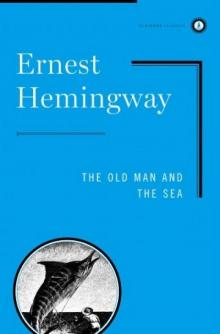 The Old Man and the Sea
The Old Man and the Sea Green Hills of Africa
Green Hills of Africa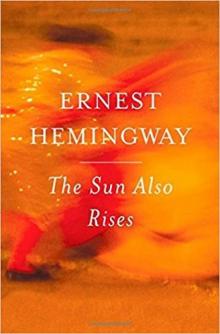 The Sun Also Rises
The Sun Also Rises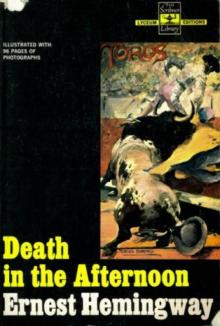 Death in the Afternoon
Death in the Afternoon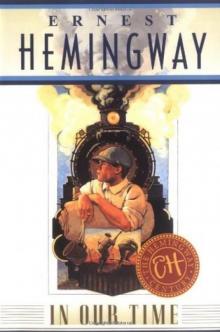 In Our Time
In Our Time For Whom the Bell Tolls
For Whom the Bell Tolls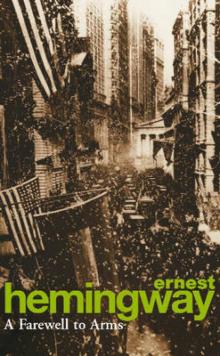 A Farewell to Arms
A Farewell to Arms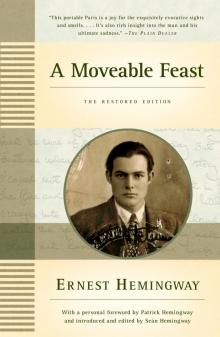 A Moveable Feast
A Moveable Feast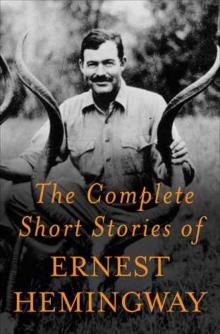 The Complete Short Stories of Ernest Hemingway
The Complete Short Stories of Ernest Hemingway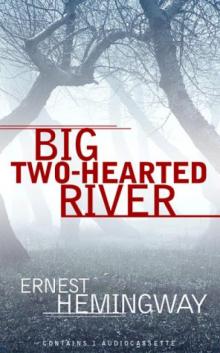 Big Two-Hearted River
Big Two-Hearted River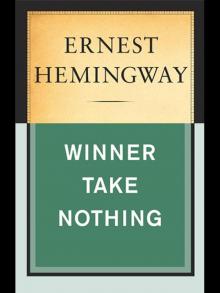 Winner Take Nothing
Winner Take Nothing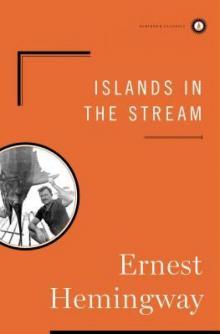 Islands in the Stream
Islands in the Stream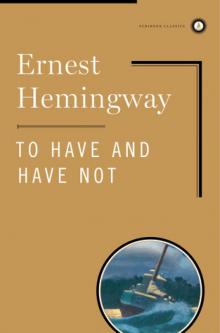 To Have and Have Not
To Have and Have Not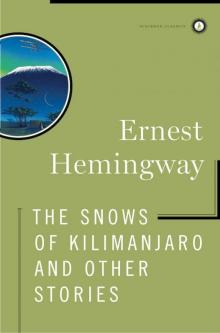 The Snows of Kilimanjaro and Other Stories
The Snows of Kilimanjaro and Other Stories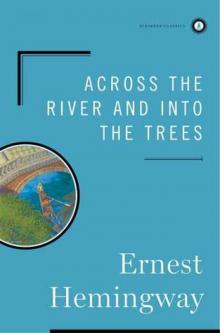 Across the River and Into the Trees
Across the River and Into the Trees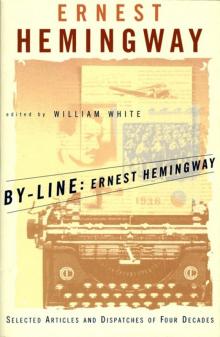 By-Line Ernest Hemingway
By-Line Ernest Hemingway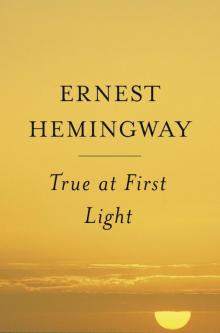 True at First Light
True at First Light Men Without Women
Men Without Women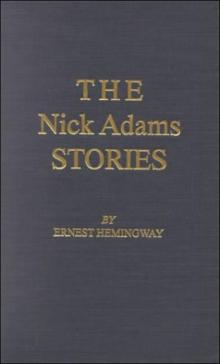 The Nick Adams Stories
The Nick Adams Stories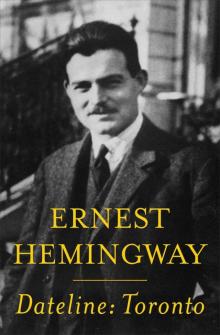 Dateline- Toronto
Dateline- Toronto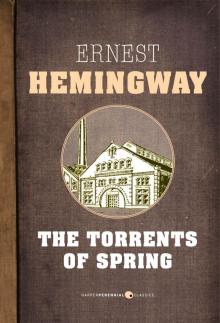 The Torrents of Spring
The Torrents of Spring Short Stories
Short Stories